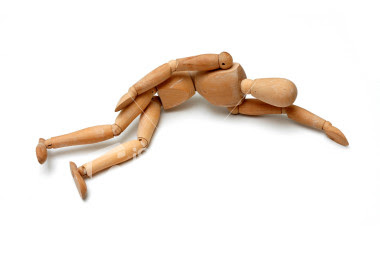I remember the day so well because the circumstances were so ridiculous.
It was my freshman year of high school, the Friday before homecoming weekend. Football players and cheerleaders wore their respective uniforms to class, I had a blue pawprint painted on my face, and everyone in class was antsy in anticipation of the pep rally at the end of the day.
Our health teacher put on some Red Cross first aid video to appease our restlessness. Halfway through the video, an actor began "bleeding" profusely from the arm. Just as his friend ripped off a bit of his t-shirt to staunch the blood, I saw a flash of blue jersey out of the corner of my eye.
One of the star football players in my class—a pretty massive beast of a human being—slumped down his chair then lay flat on the floor. He was passed out cold.
Do you get woozy when you see blood? It seems like an oddly dramatic physiological response for just seeing a little red liquid, right? As it turns out, fainting at the sight of blood may be a primitive reflex buried deep in our brain.
Fainting, or "vasovagal syncope," is a pretty uncomfortable experience.
It's mediated by the vagus nerve, one of twelve cranial nerves, which has both motor and sensory components. The vagus nerve synapses, among several notable locations, onto the nucleus of the solitary tract (NTS) in our brainstem.
Stimulating the NTS can result in one of two outcomes:
1. Activation of the parasympathetic ("rest and digest") nervous system. This results in cardioinhibition, or a drop in heart rate and the heart's ability to contract.
2. Vasodilation, or widening of blood vessels, caused by deactivation of the sympathetic ("fight or flight") nervous system. This leads to a drop in blood pressure despite no change in heart rate.
As I am, unfortunately, all too familiar, symptoms leading up to an episode of fainting include lightheadedness, ringing in the ear (tinnitus), sweating, inability to form words easily, weakness, and tunnel vision. And then we unconsciously fall, which is quite scary—but your body's smarter than you are, see, because now you're laying down. Your poor brain can receive the blood and oxygen it's been stubbornly telling you it needs.
Now back to blood. It makes sense that some kind of physical insult—prolonged standing, heat, hunger, dehydration—can lead to abnormal nerve signaling. But stress or extreme emotion, too, can trigger the NTS. Case in point: Beatles fans.
For many, seeing blood makes us slightly uneasy. For others, it's extremely stressful. Researchers believe that everybody has this fainting reflex when seeing guts, to some degree. In fact, it probably helped our very distant ancestors survive pretty gruesome events.
"If you're a caveman and another caveman comes over and cuts your arm off, the sight of blood or injury may cause you to faint. So when you're laying there on the ground, you'll look like you're dead to the other cavemen and he won't cut your head off," explains Dr. Fred Jaeger, medical director of the Syncope Center at the Cleveland Clinic in Ohio.
The drop in heart rate and blood pressure, it is believed, is beneficial in slowing bleeding if one is passed out from blood loss.
It's unknown whether one's susceptibility to passing out at the sight of blood is due to genetics, hormone levels, or some other trigger.
All I know is that it's pretty fun to liken big, tough football players with those silly goats that faint and play dead when they panic.
Zervou EK, Ziciadis K, Karabini F, Xanthi E, Chrisostomou E, & Tzolou A (2005). Vasovagal reactions in blood donors during or immediately after blood donation. Transfusion medicine (Oxford, England), 15 (5), 389-94 PMID: 16202053





Fascinating topic. The brain's hardwired reactions to stress have a lot of implications for teachers, students, soldiers, police, people with even mild social anxiety. More on this topic, please.
ReplyDelete